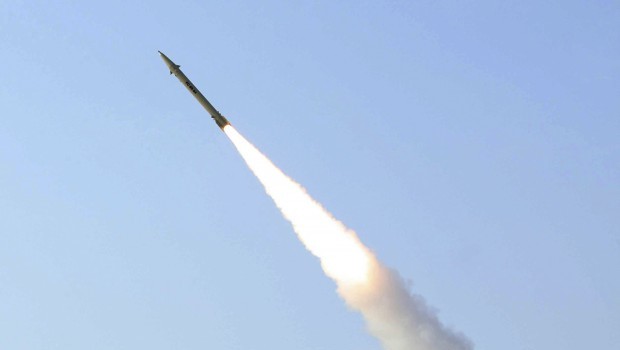
This file photo, released on Wednesday, August 25, 2010, by the Iranian Defense Ministry, claims to show the launch of the Fateh-110 short-range surface-to-surface missile by Iranian armed forces at an undisclosed location. (AP Photo/Iranian Defense Ministry/Vahid Reza Alaei)
London, Asharq Al-Awsat—The UK’s Sunday Times learned this week that the Syrian military has prepared batteries of its most advanced missiles to retaliate against Israel in the event of another air strike. This incident has increased fears that the Syrian conflict could spread beyond the borders of the war-torn country.
Israeli officials have suggested that additional raids could take place in the future, and warned of “crippling consequences” if the Syrian government reacted.
Two Israeli air strikes took on May 3 and 5, when weapons stockpiles near Damascus thought to contain Fateh-110 missiles were targeted. The deputy Syrian foreign minister, Faisal Al-Miqdad, described the attacks as “a declaration of war.”
The Tishreen, an M-600 rocket named in memory of the Arab–Israeli war of 1973, is a Syrian-manufactured version of the Iranian-made Fateh-110. It has a maximum range of roughly 125 miles, but is highly accurate compared with the previously used Soviet-era scud missiles. It is also capable of inflicting far more damage, and can deliver a warhead of up to 1100 pounds.
A Western intelligence official confirmed at the time that “in [May 5]’s attack, as in the previous one, what was attacked were stores of Fateh-110 missiles that were in transit from Iran to Hezbollah.”
An earlier airstrike also took place on January 31, in which Hussam Hush Nawis, a senior commander in the Iranian Revolutionary Guard, was allegedly killed while overseeing a transfer of weapons to Hezbollah.
So far, no known military retaliation has been attempted by Syrian forces despite suggestive rhetoric from the Ba’ath party leadership. However, the new report indicates that, based on satellite surveillance, the Syrian military is planning to strike the Israeli capital of Tel Aviv should a fourth such air raid take place.
Syrian President Bashar Al-Assad was quoted in the Lebanese Al-Akhbar newspaper as saying that “we want strategic revenge, by opening the door of resistance and turning the entire Syria into a resistance nation,” in response the the second air strike of this month.
But with the Syrian regime preoccupied with the country’s internal conflict, Israeli security concerns are focused more on Hezbollah.
Former military intelligence chief Major General Amos Yadlin said on Israeli radio on Sunday that Assad “is much more dangerous to Israel than any regime that would follow him, because he allows Iran to smuggle missiles and weapons into Lebanon.”
